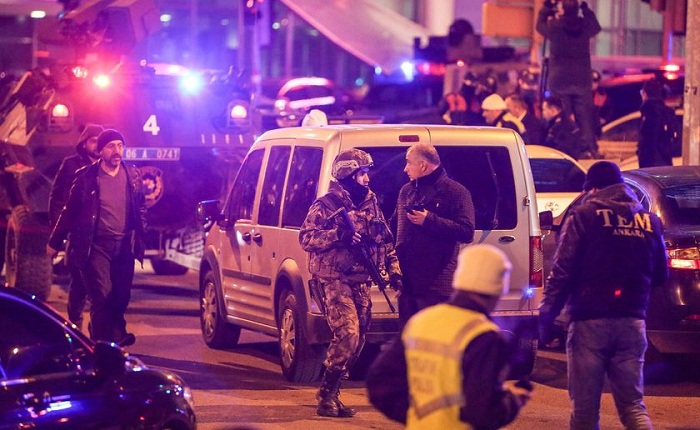Why a Russian’s killing in Turkey was about Syria?

1. Why might the gunman have mentioned Aleppo?
Aleppo is where Russian-backed Syrian troops defeated rebels, most of them Sunni Muslim, after some of the fiercest fighting of the almost six-year-old civil war. Though Turkey actively supported the rebels since the early stages of the war, more recently it’s put a higher value on steering clear of Aleppo so as not to interfere with Russia’s campaign on behalf of President Bashar al-Assad.
2. What happens now to Turkey’s reconciliation with Russia?
Any major damage seems unlikely, with officials from both sides saying bilateral ties are too important to be damaged by the killing. Turkey’s interior minister, Suleyman Soylu, called the shooting “a terror attack against Turkish-Russian relations.” Russian and Turkish foreign and defense ministers, along with their Iranian counterparts, plan to go ahead with a meeting in Moscow on Tuesday to discuss recent developments in Syria. “There won’t be a new chill in the relationship,” Leonid Slutsky, head of the international affairs committee in Russia’s lower house of parliament, said on Rossiya 24 state television.
3. Are Russia and Turkey allies?
More like a budding friends. Turkey joined the North Atlantic Treaty Organization in 1952, along with Greece, as the U.S. and its western allies sought bulwarks against the spread of communism. Since the collapse of the Soviet Union in 1991, Turkey and Russia have been trade and tourism partners. In October, the two nations agreed to work together on a natural-gas pipeline under the Black Sea.
4. Why were tensions already high between Russia and Turkey?
From the outbreak of Syria’s civil war in 2011, Russia and Turkey have found themselves at odds over the fate of Assad. Turkish President Recep Tayyip Erdogan has called him “a more advanced terrorist than ISIS”; Russian President Vladimir Putin sent his military to Assad’s rescue. The Russian-Turkish relationship came to the edge of breakdown after Turkish jets shot down a Russian warplane in November 2015 near the border with Syria, saying the aircraft had entered Turkish airspace. Putin imposed sanctions on Turkish exports and its tourism industry. The relationship has been recovering since Erdogan expressed “profound condolences” for the incident.
5. How damaging could this be to the Turkish economy?
Turkey’s $860 billion economy was hit hard after the jet shootdown. Putin’s ban on Russian tourists, along with a slew of terrorist attacks, weighed on Turkey’s tourism industry, which accounts for about 6 percent of gross domestic product. The number of foreign visitors declined more than 25 percent in October from a year earlier, extending the stretch of declines to a record 15 months. “The most immediate impact of the latest development is that the hopes for a return of Russian tourists to Turkey is unlikely to materialize,” Teneo Intelligence Co-President Wolfango Piccoli said by e-mail.
6. What does this say about Turkey’s security?
The assassination comes in the wake of two recent attacks, one claimed by Kurdish separatists and another the government blames on Kurdish separatists, that killed more than 50 people in Istanbul and Kayseri provinces. Kurdish militant group PKK and Islamic State have staged several bombings across Turkey since July 2015, killing hundreds of people in Turkey’s major cities. Turkey stepped up fighting against both groups in a cross-border operation in Syria that began in August. The latest attack “demonstrates the worsening security environment in Turkey, and places the government’s Syria policy in the spotlight,” Eurasia Group analyst Zachary Witlin said in an e-mailed note.
7. What happens next?
Turkey and Russia formed a joint task force to investigate the killing and will intensify their cooperation against terrorism, Erdogan said in a televised speech. He also vowed more cooperation in Syria’s civil war, a possible signal that Putin will get an even freer hand there. “Moscow will press Ankara harder to move toward Russia’s position calling for a transition government that is more favorable” to Assad, according to Eurasia’s Witlin.
/Bloomberg/















































